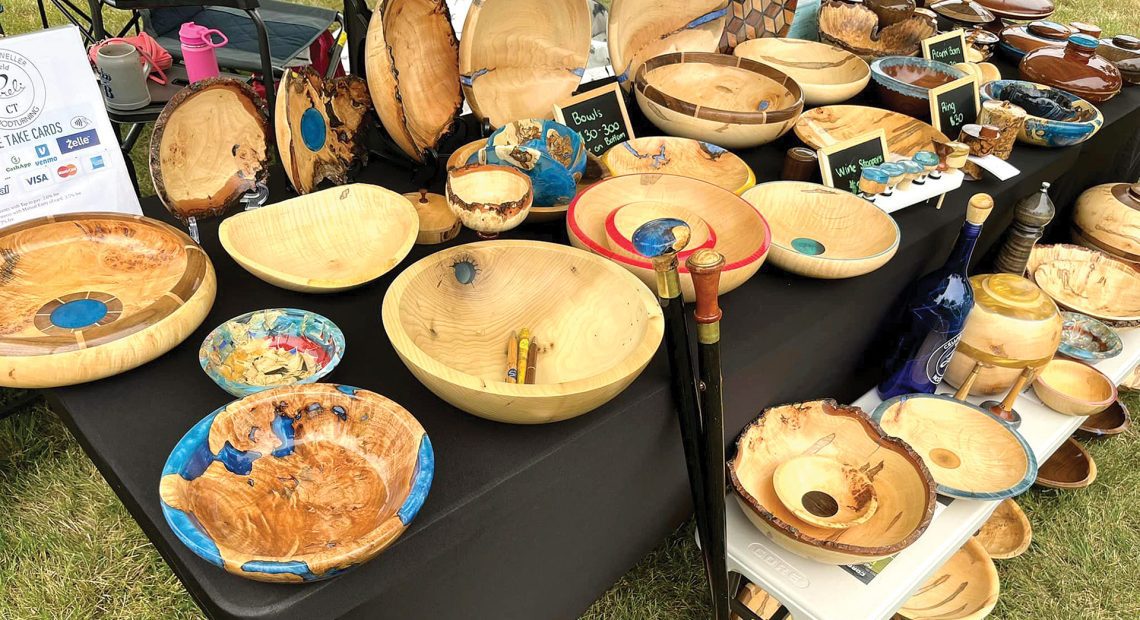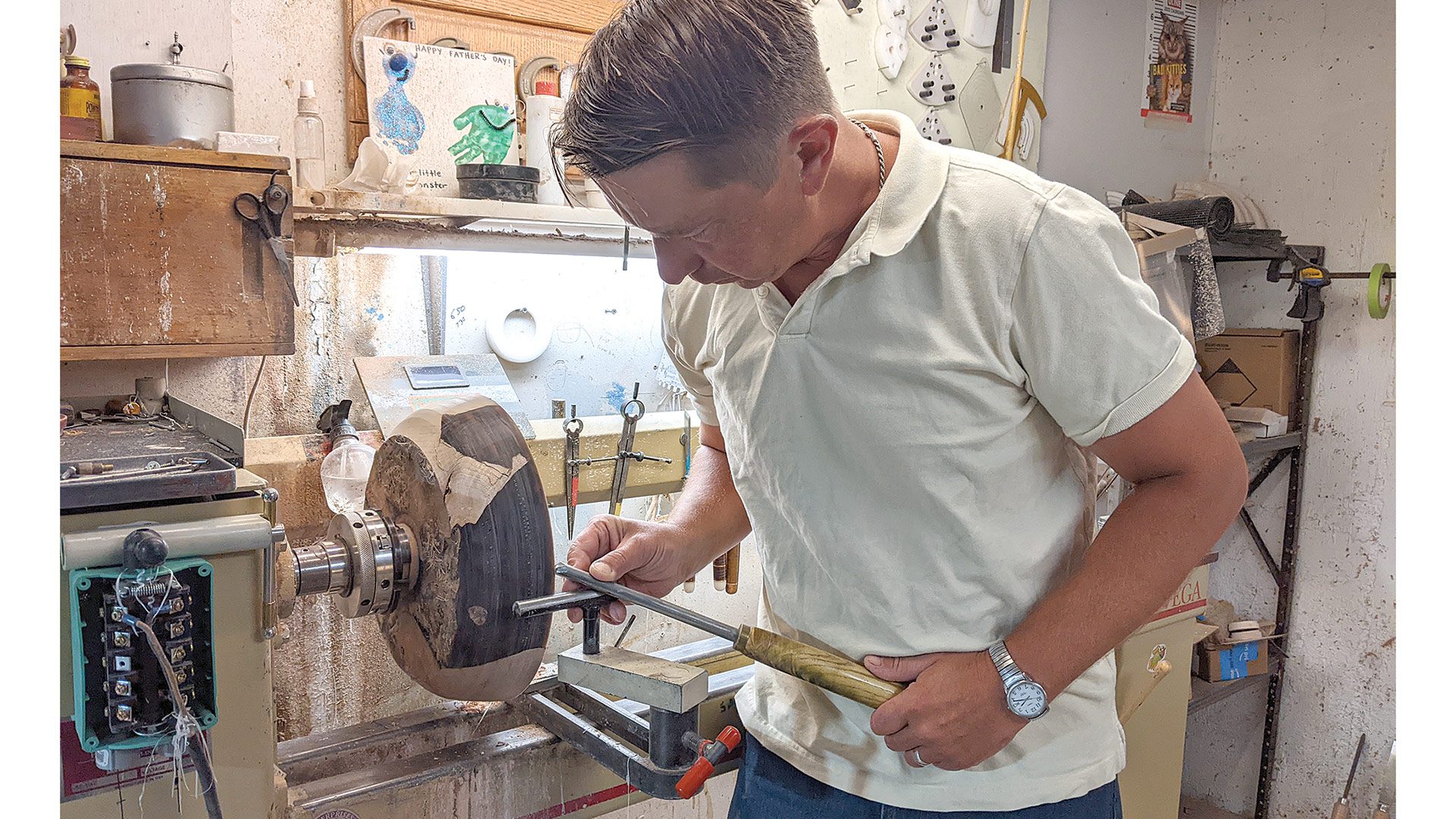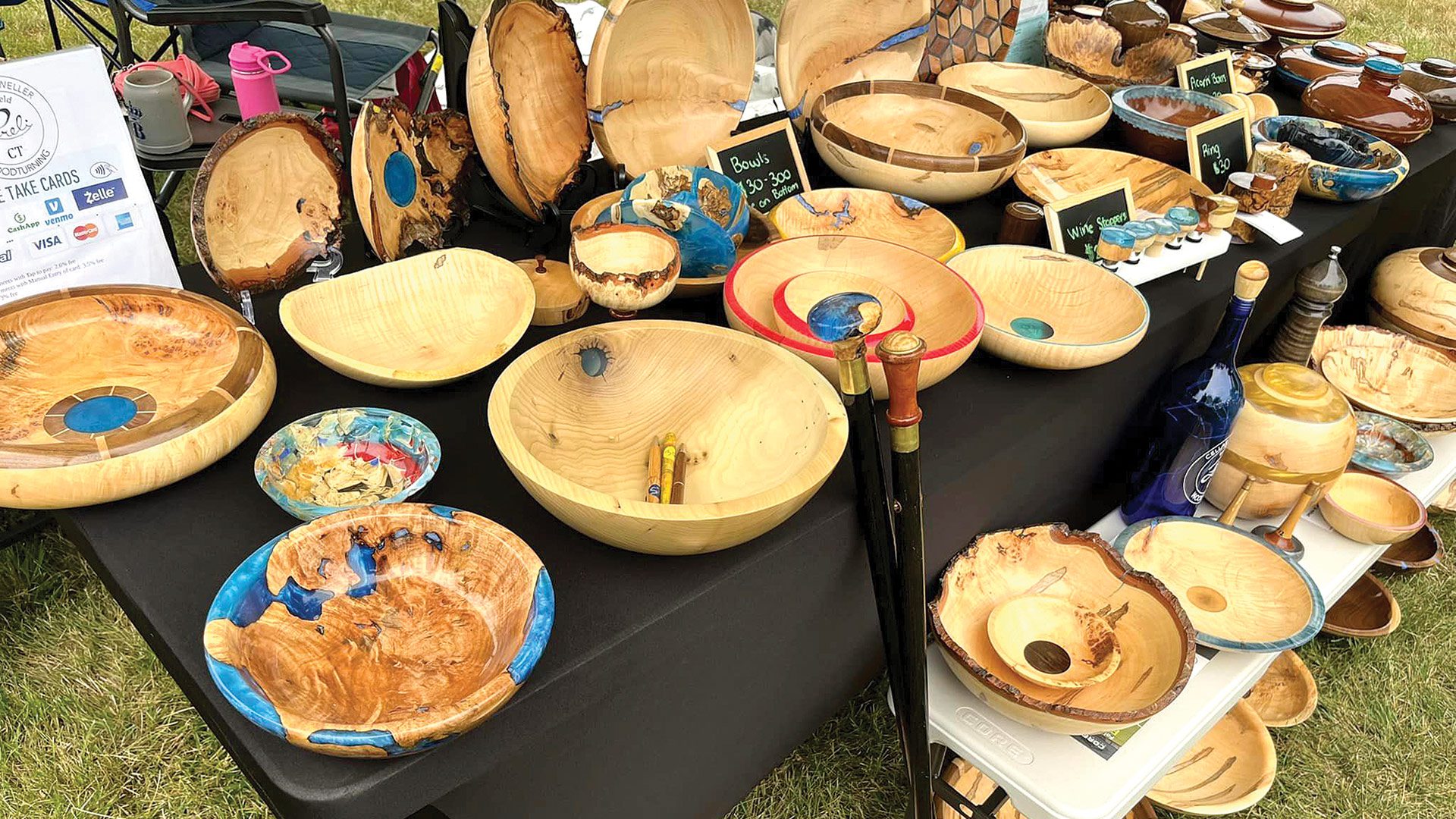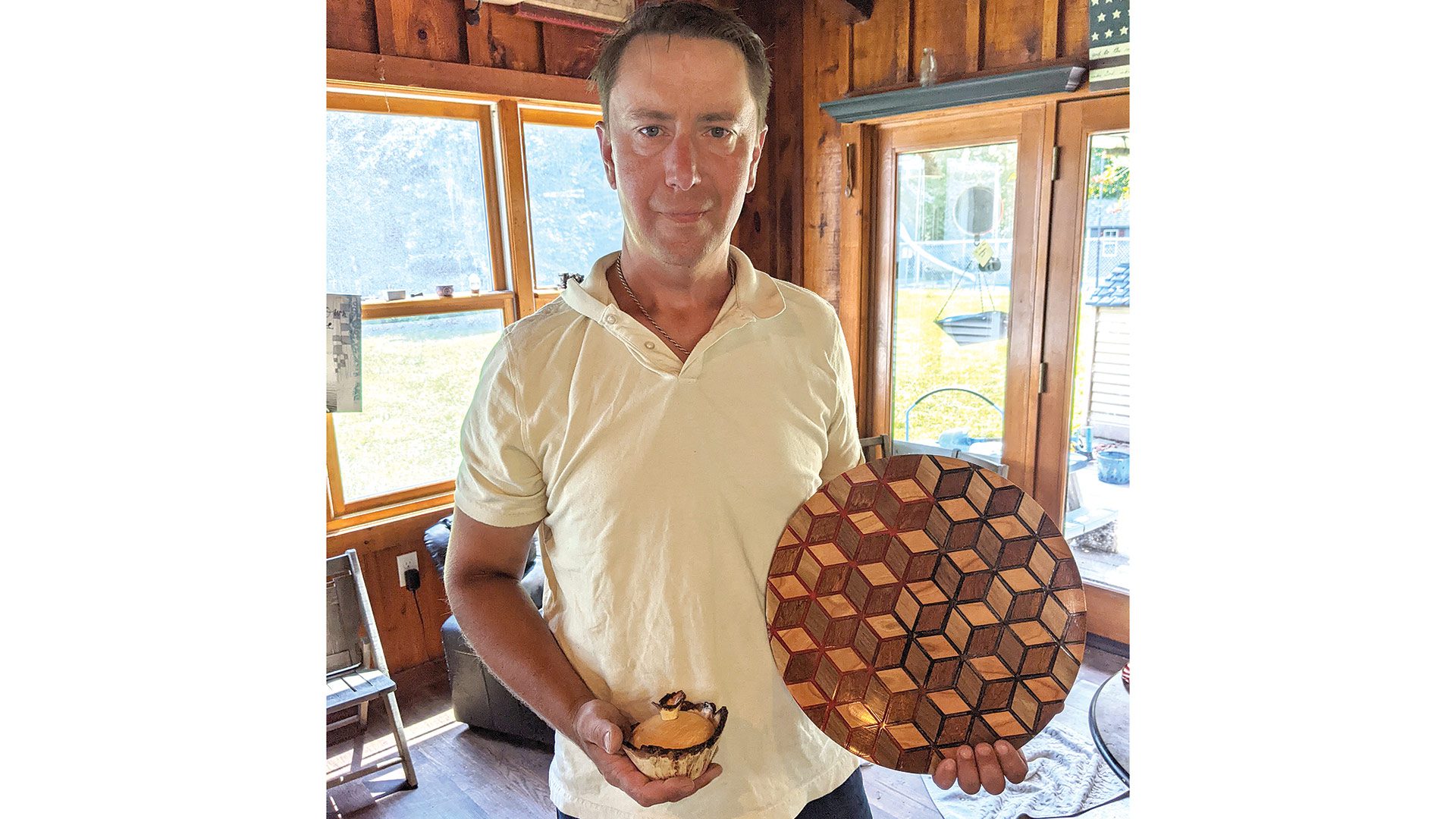
Michael Preli Turns His Woodturning Passion into a Successful Business
Super Bowls

Michael Preli works on the lathe in his basement in Suffield.
Michael Preli’s career has been one of constant advancement — not necessarily in title or income, but in job satisfaction. And he’s a long way from where he started, in the auto-body field.
“My father is a frame technician for auto body. And I always thought that’s what I wanted to do,” Preli told BusinessWest. “So I started working in a body shop when I left school. I did that for a couple of years.”
What he didn’t expect was that he’d come to like wood more than metal.
Auto-body work “didn’t bring me the satisfaction I thought it would,” he recalled. “Metal is cold and dirty and dusty — like, the dust sticks to you.”
Meanwhile, his rented house, on the same property he worked at, needed some improvements, including a new door. He did the job himself, even though he had never done any woodworking.
“I got a lot of satisfaction from it. My boss came over and looked at it and said, ‘wow, you did a really nice job on this.’ I said, ‘oh, thanks.’ And that stuck with me for a while. So, when an opportunity came up to do framing for houses, I took it, and I left the world of auto body. Thank God.”
These days, Preli owns his own home-based business in Suffield, Conn., Cellar Dweller WoodTurning, creating and selling a host of artful pieces, including plates, bowls, urns, and decorative pieces. But it took a couple more steps to get there, as we’ll see.
Starting with framing, which he characterized as work with “a lot of brute force, not a lot of finesse. I always gravitated toward the jobs that took more patience, and my overseers saw that and placed me there.”
“It got my wife motivated, too, because she could see that, with a young child, I had an opportunity to do something from home instead of going back to work.”
Indeed, Preli started focusing on finish work, such as crown molding, fireplace mantles, door frames, doors, and windows. “I did that for many years, along with remodeling and renovating. And then I got into doing furniture, which took more patience and required more solitary-type work.”
Even through the decade he spent making furniture out of a rented shop, he never saw himself in woodturning, a craft that uses a wood lathe and hand-held tools to create symmetrically shaped pieces. “I thought I loved making furniture. But now that I’ve stepped away from it, did I really like doing furniture? I mean, I felt like I did.”
He switched gears, however, after his landlord passed away, and he lost his shop and moved all his tools back home, returning to commercial finish work while he and his wife, Kathryn, decided to start a family; their son was born in 2019.
“I was still working very hard, but my wife’s a doctor. She makes way more than I’ll ever be able to make. So she was going to continue working, and I planned to stay home until the kid was old enough to talk, and then go back to work.”
Then a pandemic struck, and that changed everything.
Crafting a Career
Specifically, it forced Preli to be home even more than he had planned to, and introduced a hobby into his life.
In some ways, he said the isolation many people faced during COVID was a blessing to his own household. “We even got COVID — we got colds and got over it — but it gave me a chance to put my tools down for the first time ever. This was the first time ever I hadn’t been working. I mean, I dropped out of high school young to work. Now I was home with my boy the whole time. It was wonderful. That’s when I picked up woodturning, just as a hobby.”
Showing off the lathe in his basement, Preli noted that “it’s a specific type of woodworking. The only thing I can do on that machine is round work, and that’s what I got into.”
Soon, the hobby started filling the Prelis’ kitchen with bowls and other items.
“I always undervalue my work, but my wife was like, ‘man, this stuff is coming out great.’ I’d been giving out a lot of stuff, giving gifts to my family. And of course, they said, ‘yeah, thanks, Mike, it looks great.’ But they’re my family. I could have given them anything, and they would say that.”

These are some of the items Michael Preli sold at the recent Suffield Summer Fair.
What convinced Preli that they weren’t just being polite was a craft-selling event at a local Tractor Supply Co., where his wife decided to set up shop.
“I said, ‘don’t do it, Kathryn. You’re going to spend the whole day there. It’s hot out. Don’t bother,’” he recalled. “She said, ‘I’m going to do it.’ She set herself to it, and she made a killing. We sold so much stuff. I didn’t think anyone would buy anything, but we sold a lot. It gave me some inspiration, and it got my wife motivated, too, because she could see that, with a young child, I had an opportunity to do something from home instead of going back to work.”
After all, he said, commercial finish work can be a six-days-a-week gig, and they both preferred Michael to be mainly home during that time.
“It’s nice to know that something I made with my hands is going to be the object of beauty beauty in someone’s home for a long time.”
“So it just worked out great,” Preli said. “And slowly, we started doing these craft fairs, and the revenue was good. We made it happen. My wife takes care of all the logistics for these shows and fairs.”
Those events take place most weekends and are the main sales source; online sales haven’t been so robust, and Preli believes that might be partly because he sells tactile items that people want to touch — and are far more likely to buy once they do.
“Plus, online, there are so many options,” he said. “I’m not the only guy selling wood bowls there; there are thousands and thousands. And shopping online, you want to save money, so you gravitate toward something less expensive, maybe not the best quality … but to each his own. We do very well in person.”

Michael Preli says he was surprised when his creations first met an eager reception with buyers.
He enjoys talking to customers, especially when he hears what they plan to do with the items they buy. “I don’t know what anyone would ever do with some of these things I make, but they buy them. And it gives me some ideas, too. It’s nice to know that something I made with my hands is going to be the object of beauty beauty in someone’s home for a long time.”
When he started out, Preli worked with a number of different finishes, but most people gravitated to his half-epoxy, half-wood hybrid pieces that boast a smooth, shiny finish, so that’s the work he focuses on. “People love this stuff. They sell almost instantly.”
Joy in the Journey
While Preli didn’t think of woodturning during his framing or furniture-making days, he said the trajectory seems natural now; essentially, as his work became finer in scope, he loved it more.
“I get a lot of joy from it. My wife is proud of me. My family is proud of me. I have time for my son. I’m very happy with it.”
He said many people come home from work and spend time with their hobby, but he feels like the Cellar Dweller business is a hobby-like experience: something he does for fun that also generates income.
“That thing you’re compelled to do, I get to do that every day,” he said. “And it requires such a high level of concentration and patience. Everything melts away; it’s very much tunnel vision. I get to do that, and I’m so lucky.
“I keep it small, and I would say it’s a good life,” he continued. “The stress from doing commercial work, competing, bidding, dealing with different people — you know, some people aren’t as pleasant as others — and just being stuck in traffic and shopping for stuff at Home Depot … that’s all gone. It’s a relief.”




